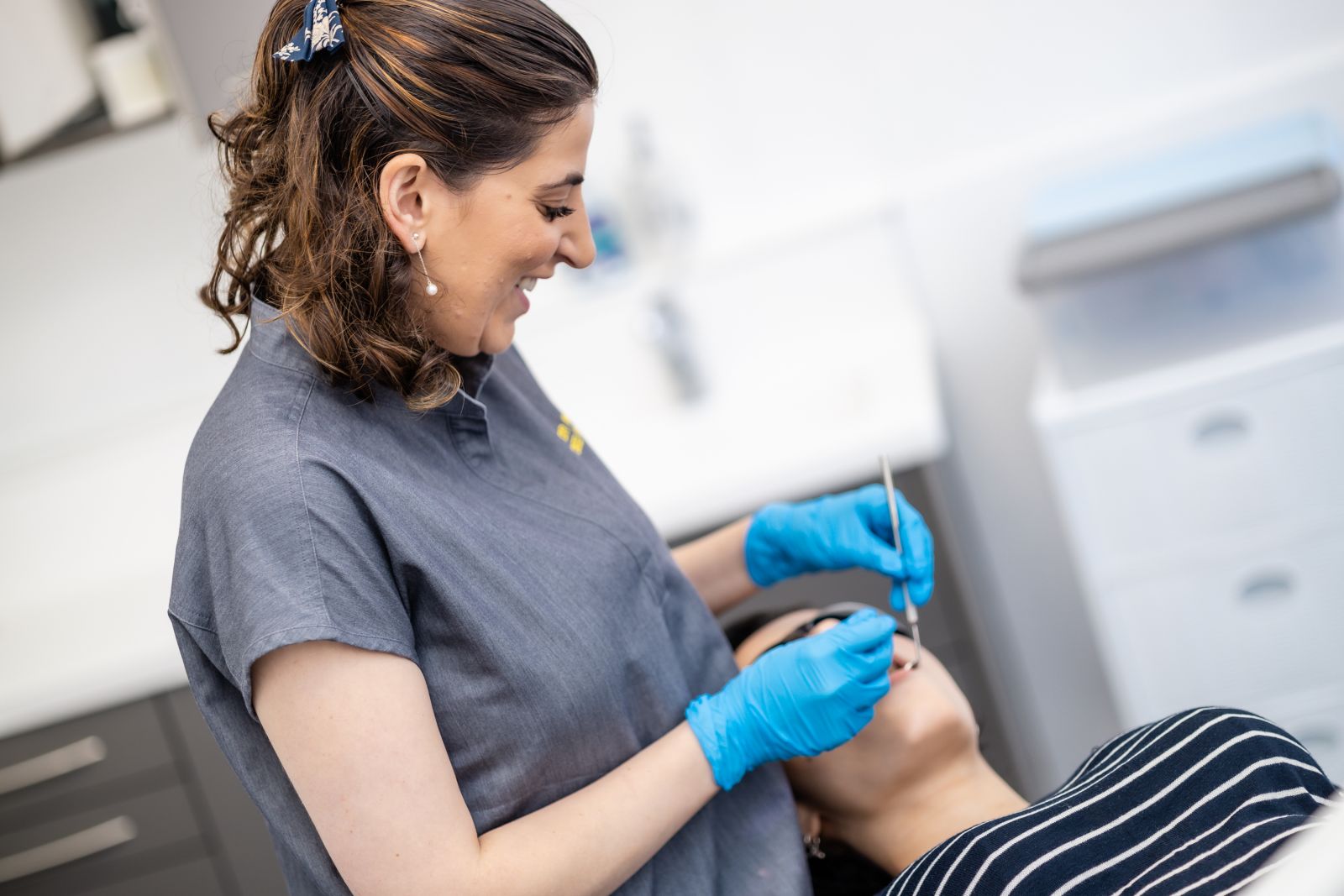How Dental Implants Are Placed
Dental implants have become the go-to treatment for replacing missing or damaged teeth. They offer patients the chance to enhance their smile, improve their oral health and dramatically increase their confidence.
But how exactly does the dental implant procedure work? And what is involved in dental implant surgery?

The dental implant procedure: What to expect?
So what can you expect from dental implant surgery?
Before any work is carried out on your teeth and mouth, a thorough assessment will need to be made. Most people are suitable for dental implants, however, patients that have particularly weak jawbones will often not be able to undergo implant treatment unless they first receive a bone graft to strengthen the jawbone. Patients' medical history will also be taken into consideration.
The reason for this is that the implant is placed directly into the gum tissue and fuses with the jawbone. If a patient has suffered significant bone loss, the procedure will not be successful and the jawbone could become badly damaged.
As long as you have a healthy jawbone, as determined by our x-rays, the procedure will be safe to go ahead with.
The surgery is then split into two main operations; the initial implant surgery and the fitting of the false tooth cap. Let's look at both in more detail.
.png)
Implant Surgery
If it’s agreed that dental implant surgery is the best option for you, your surgical appointment will then be arranged. The implants will be put in place under sterile conditions by the dental implant surgeon.
Implant placement is carried out under a local anaesthetic to provide a smooth and relatively pain-free experience for the patient.
The implants, which act as artificial tooth roots, are titanium screws that are placed directly into the gap where the missing tooth once way. It goes directly into the gum tissue and fuses with the jawbone.
Over time, the jawbone will begin to cling on to the new root just as it would with natural tooth roots, therefore providing a solid, secure base for the replacement tooth to be fitted to.
The dental implant process also helps strengthen jawbones that have weakened over time due to lost or missing teeth. The teeth around the implant will also adapt to the new implant site, helping keep your natural teeth straight, aligned and healthy.
The length of dental implant surgery depends on the number of implants being placed and the individual state of the patient's mouth, but in general, it should take no longer than two hours.
The Healing period
After the initial implant surgery, patients will need some time to heal and let their mouths adjust to the trauma and the insertion of the implant post before having the replacement tooth fitted.
Many patients can heal very quickly from the initial implant surgery, with the majority of patients not finding the process to be overly debilitating, being able to return to work the following day.
This is due to the surgery being carried out so precisely by our dentists, with a very minimal risk involved in modern implant dentistry.
Our dental specialists will provide detailed aftercare instructions and give a proposed date to fit the aesthetic tooth crown.
In most cases, it is suggested that a period of two-three months (although sometimes more) should be allowed for the implant to fully integrate with the bone and mouth before any further dental work is carried out.
During this time, patients can wear a simple adhesive bridge, temporary crown or provisional partial plate to cover the implant. Wait until the time comes to fit the replacement tooth cap.
Once your proposed date rolls around your dental specialist will assess the progress before beginning the second part of the dental implant procedure.
Final step: Crown fitted to dental implant
Once the titanium posts have healed and integrated with the mouth and bone, the restoration phase can take place. The restoration phase is a simple procedure as the hard work has already been done via the titanium implant post.
As the acting tooth root, the abutment placement will provide a stable and secure base for the aesthetic tooth, allowing patients to eat and talk as normal immediately after the replacement tooth has been attached.
Restorative options include dental crowns, dentures and bridges.
Crowns are made to match the colour of the patients’ natural teeth and can be made from either porcelain or ceramic. Bridges are either single or multiple artificial teeth secured by clipping onto the natural teeth on either side of the implant (if applicable). Dentures can also be clipped onto dental implants.
The type of replacement tooth chosen is up to the patient, but of course, our dentist will advise on the best-recommended course of action for your new teeth.
Once the crown or cap has been fitted, your implants will look and feel just like natural teeth. They will be strong, durable, aesthetically pleasing and comfortable in the mouth. But in order to keep them this way, it's important to apply a good level of aftercare.
Aftercare
Looking after your dental implants properly is key if you want them to last for many years. If properly cared for dental implants can last for over 10 years before the cap need to be changed. The implant post itself should remain intact for a lifetime .
As dental implants act as a natural tooth replacement, you simply need to practice good oral hygiene and treat your implants as if they were real teeth to ensure they stay healthy, strong and looking good.
Regular dental check ups are advised, as are trips to the dental hygienist. Continue to brush twice daily and floss once a day. No extra attention needs to be paid to your dental implant, but make sure you keep an eye on it after the surgery to ensure everything is working as normal.
If you feel any pain, discomfort, loosening or breaking, please contact our dental specialists ASAP.
Out with this, patients are free to go about their life as normal with a full, healthy smile intact. Your new tooth will quickly begin to feel just like a permanent tooth, and in a few short weeks, you won't notice the difference!
.jpg)
Dental implants FAQs
Is it painful to have a tooth implant put in?
While some discomfort is normal during and after the dental implant procedure, most patients report minimal pain. Our team takes precautionary measures to make sure your comfort throughout the process.
How long does a dental implant take to finish?
The timeframe for completing a dental implant procedure can vary depending on individual factors such as bone density and healing ability. On average, the entire dental implant steps, from implant placement to restoration, can take several months.
However, our experienced team will guide you through each step and provide a tailored plan based on your needs.
How long does it take to recover from a tooth implant?
The recovery time for dental implant varies from patient to patient. Most patients experience some swelling and discomfort for a few days following the surgery, which can be managed with pain medication and cold compresses.
Full recovery typically takes a few weeks to a few months, during which the implant integrates with the jawbone.
Tooth Bridge vs Implant: What’s the Difference?
While both dental implants and tooth bridges are effective tooth replacement options, they differ in several aspects. Dental implants replace missing teeth by integrating with the jawbone, providing a stable and long-lasting solution.
In contrast, tooth bridges rely on adjacent teeth for support and may require modification of healthy teeth.
What are the benefits of implants?
Dental implants have many benefits, including improved oral function, enhanced aesthetics, durability, and preservation of bone structure. Unlike removable dentures, implants feel and function like natural teeth, allowing you to eat, speak, and smile with confidence.
How are dental implants done
The dental implant procedure involves several stages, including consultation, implant placement, healing period, and placement of the restoration. During the initial surgery, a small titanium implant is surgically placed into the jawbone.
Over time, the implant fuses with the bone, providing a strong foundation for the replacement tooth or teeth.

Dental implants in Paisley
Dental implant surgery is a truly great option for anyone suffering from missing or damaged teeth. Your smile will be restored and with it, your confidence and oral health will dramatically improve.
If you're considering dental implants or have any questions about the procedure, don't hesitate to reach out to us. Our experienced team is here to guide you through every step of the process and provide comprehensive care to address your needs.
Schedule a consultation today and take the first step toward achieving a confident, healthy smile with dental implants. Don't wait any longer – your dream smile is just a phone call away!



